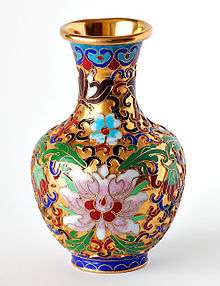vase
English

A Chinese vase.
Etymology
Borrowed from Middle French vase, from Latin vas.
Pronunciation
- (Received Pronunciation) IPA(key): /vɑːz/, /vɔːz/
- Rhymes: -ɑːz
- (US) IPA(key): /veɪs/, /veɪz/, /vɑz/
Audio (US) (file) - Rhymes: -eɪs
Noun
vase (plural vases)
- An upright open container used mainly for displaying fresh, dried, or artificial flowers.
- (architecture) The body of the Corinthian capital.
Translations
container used mainly for displaying flowers
|
|
Danish
Pronunciation
- IPA(key): /vaːsə/, [ˈvæːsə]
Declension
French
Pronunciation
- IPA(key): /vaz/, /vɑz/
audio (un vase) (file)
Etymology 1
From Middle French, from Middle Dutch wase (“mud, silt, wet ground, clod of dirt, grass”), from *Old Dutch waso, from Proto-Germanic *wasô (“moisture, ground”), from Proto-Indo-European *wes- (“moist, wet”). More at ouze.
Etymology 2
From Old French, borrowed from Latin vas, vasis.
Further reading
- “vase” in le Trésor de la langue française informatisé (The Digitized Treasury of the French Language).
Latin
Norwegian Bokmål
Norwegian Nynorsk
Pali
Alternative forms
Alternative forms
- 𑀯𑀲𑁂 (Brahmi script)
- वसे (Devanagari script)
- ৱসে (Bengali script)
- වසෙ (Sinhalese script)
- ဝသေ (Burmese script)
- วเส or วะเส (Thai script)
- ᩅᩈᩮ (Tai Tham script)
- ວເສ or ວະເສ (Lao script)
- វសេ (Khmer script)
This article is issued from
Wiktionary.
The text is licensed under Creative
Commons - Attribution - Sharealike.
Additional terms may apply for the media files.